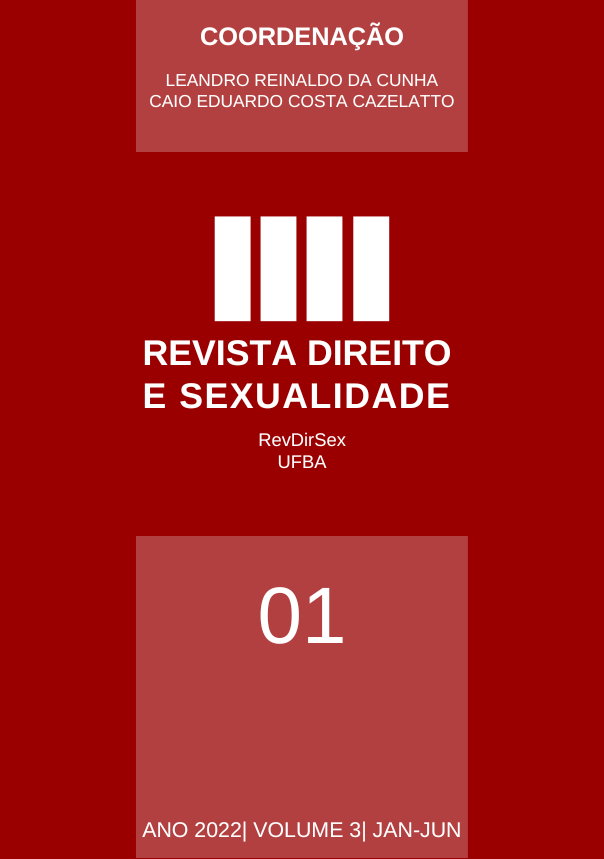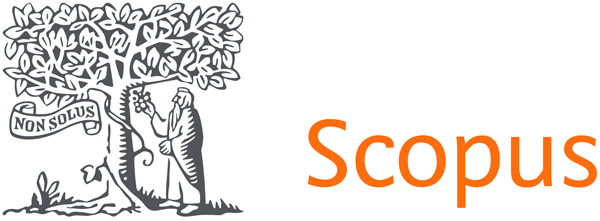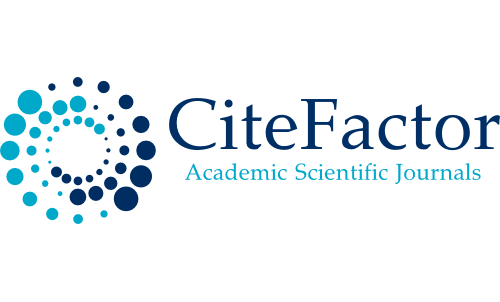LGBTFOBIA EM FOCO
A ATUAÇÃO DO SISTEMA INTERAMERICANO DE DIREITOS HUMANOS
DOI:
https://doi.org/10.9771/revdirsex.v3i1.47055Keywords:
Inequality; Human rights; LGBTphobia; Inter-American System of Human Rights.Abstract
Sexual, moral, physical violence and exclusion against the LGBTQIA+ population are latent. Societies that organize themselves by the rigid dual classification of gender, that is, male and female, tend to marginalize all those who subvert this order. LGBTphobia is present all over the world, becoming a cruel reality for thousands of individuals. In Brazil it is not different, many surveys, statistics and surveys by non-governmental organizations demonstrate the high rate of LGBTphobia in the country. Despite being an existing practice in several societies, LGBTphobia violates the Human Rights enshrined in 1948. The Inter-American System of Human Rights has been working to defend and fight against the serious violations suffered by LGBTQIA+ people in the American States. The Commission has been reiterating that member states must not only guarantee equality before the law under their jurisdiction but also adopt effective legislative measures to ensure that the rights enshrined in international treaties are exercised. In this way, the work seeks to present the evolution of the Organization of American States (OAS) action on the subject of the human rights of the LGBTQIA+ population and the performance of specialized bodies to ensure the implementation and development of agreements and recommendations in the Organization's member states.
Downloads
References
BENEVIDES, BRUNA G.; NOGUEIRA, SAYONARA N. B. Dossiê dos assassinatos e da violência contra travestis e transexuais brasileiras em 2020. 2021. Disponível em: https://antrabrasil.files.wordpress.com/2021/01/dossie-trans-2021-29jan2021.pdf. Acesso em 30 set. 2021.
BUTLER, Judith. Corpos que pesam: sobre os limites discursivos do “sexo”. In: LOURO, G. L. (Org.). O corpo educado: pedagogias da sexualidade. 2.ed. Tradução dos artigos: Tomaz Tadeu da Silva. Belo Horizonte: Autêntica, 2000.
_____________. Problemas de Gênero: feminismo e subversão da identidade. Rio de Janeiro: Civilização Brasileira, 2020.
________________. Relatar a si mesmo: crítica da violência ética; tradução Rogério Bettoni. - 1º ed. Belo Horizonte: Autêntica Editora, 2015.
COMISSÃO INTERAMERICANA DE DIREITOS HUMANOS. Violência contra PessoasLésbicas, Gays, Bissexuais, Trans e Intersexo nas Américas. 2015. Disponível em:https://www.oas.org/pt/cidh/docs/pdf/ViolenciaPessoasLGBTI.pdf. Acesso em: 20 set. 2021.
______. Avances y Desafíoshaciaelreconocimiento de losderechos de las personasLGBTI enlas Américas. 2018. Disponível em: http://www.oas.org/es/cidh/informes/pdfs/LGBTI-ReconocimientoDerechos2019.pdf. Acesso em: 20 set. 2021.
FOUCAULT, Michel. História da Sexualidade I: A vontade de saber, tradução de Maria Thereza da Costa Albuquerque e J. A. Guilhon. Rio de Janeiro, Edições Graal, 1988.
_________________. História da Sexualidade II: O uso dos prazeres, tradução Maria Thereza da Costa Albuquerque e J. A. Guilhon. Rio de Janeiro, Edições Graal, 1984.
_________________. A verdade e as formas jurídicas/ Michel Foucault, tradução Roberto Cabral de Melo Machado e Eduardo Jardim Morais, supervisão final do texto Léa Porto de Abreu Novaes. Rio de Janeiro: Nau Ed. 1999.
_________________. 1926 – 1984. Microfísica do poder / Michel Foucault; organização, introdução e revisão técnica de Roberto Machado. – 25º. Ed. – São Paulo: Graal, 2012.
GORISCH, Patrícia. Reconhecimento dos Direitos Humanos LGBT: de Stonewall à ONU. Curitiba: Appris, 2014.
JUNQUEIRA. Rogério Diniz. Homofobia: limites e possibilidades de um conceito em meio a disputas. Bagoas - estudos gays: gênero e sexualidades. Revista de estudos Gays, Natal: UFRN, v.1, n1, p. 145-165, 2007.
LACERDA, Emerson. LGBTfobia e o Regime de Normalização das Subjetividades. Dissertação de Mestrado, Recife, 2018.
MISKOLCI, Richard. Não ao sexo rei: da estética da existência foucaultiana à política queer.In SOUZA, L. A. F.; SABATINE, T. T.; MAGALHÃES, B. R. (Orgs.). Michel Foucault: sexualidade, corpo e direito. Marília: Oficina Universitária; São Paulo: Cultura Acadêmica, 2011.
ORGANIZAÇÃO DOS ESTADOS AMERICANOS. Carta da Organização dos Estados Americanos. 1948. Disponível em: https://www.oas.org/dil/port/tratados_A-5041_Carta_da_Organiza%C3%A7%C3%A3o_dos_Estados_Americanos.htm . Acesso em: 30 set. 2021.
______. Convenção Americana de Direitos Humanos: Pacto de São José da Costa Rica. 1969. Disponível em:http://www.pge.sp.gov.br/centrodeestudos/bibliotecavirtual/instrumentos/sanjose.htm. Acessoem: 30 set. 2021.
______. Convenção Interamericana contra Toda Forma de Discriminação e Intolerância. 2013b. Disponível em: https://www.oas.org/en/sla/dil/docs/inter_american_treaties_A69_Convencao_Interamericana_disciminacao_intolerancia_POR.pdf. Acesso em: 30 set. 2021.
______.Resolución n. 2435. Derechos humanos, orientación sexual e identidad de gênero. 2008. Disponível em: https://www.oas.org/dil/esp/AG-RES_2435_XXXVIII-O-08.pdf. Acesso em: 30 set. 2021.
______. Resolución n. 2504. Derechos humanos, orientación sexual e identidad de gênero. 2009. Disponível em: https://www.oas.org/dil/esp/AG-RES_2504_XXXIX-O-09.pdf. Acesso em: 30 set. 2021.
______. Resolución n. 2600. Derechos humanos, orientación sexual e identidad de gênero. 2010. Disponível em: https://www.oas.org/dil/esp/AG-RES_2600_XL-O-10_esp.pdf. Acesso em: 30 set. 2021.
______. Resolución n. 2653. Derechos humanos, orientación sexual e identidad de gênero. 2011. Disponível em: http://www.oas.org/dil/esp/AG-RES_2653_XLI-O-11_esp.pdf. Acesso em: 30 set. 2021.
______. Resolución n. 2721. Derechos humanos, orientación sexual e identidad de gênero. 2012. Disponível em: http://www.oas.org/dil/esp/AG-RES_2721_XLII-O-12_esp.pdf. Acesso em: 30 set. 2021.
______. Resolución n. 2807. Derechos humanos, orientación sexual e identidad y expresión de gênero. 2013a. Disponível em: http://www.oas.org/es/sla/ddi/docs/AG-RES_2807_XLIII-O13.pdf. Acesso em: 30 set. 2021.
______. Resolución n. 2863. Derechos humanos, orientación sexual e identidad y expresión de gênero. 2014. Disponível em: http://www.oas.org/es/cidh/lgtbi/docs/AG-RES2863-XLIV-O14esp.pdf. Acesso em: 30 set. 2021.
______. Resolución n. 2887. Promoción y protección de derechos humanos. 2016a. Disponível em: http://www.oas.org/es/cidh/lgtbi/docs/AG-RES-2887-DerechosHumanosOrientacionSexual-IdentidadExpresionGenero.pdf. Acesso em: 30 set. 2021.
______. Resolución n. 2908. Promoción y protección de derechos humanos. 2017. Disponível em: http://www.oas.org/es/cidh/lgtbi/docs/AG-RES-2908-2017-LGBTI.pdf. Acesso em: 30 set. 2021.
______. Informe nº. 11/16. Petición 362-09. Admisibilidad. Luiza Melinho. Brasil. 2016b. Disponível em: http://www.oas.org/es/cidh/decisiones/2016/BRAD362-09ES.pdf. Acesso em: 24 out. 2021.
______. Informe nº. 337/20. Petición 993-13. Admisibilidad. Kérika de Souza Lima y familiares. Brasil. 2020. Disponível em: https://www.oas.org/es/cidh/decisiones/2020/BRAD993-13ES.pdf. Acesso em: 24 out. 2021.
PIOVESAN, Flávia. Direitos Humanos e Direito Constitucional Internacional. 14. ed. SãoPaulo: Saraiva, 2013. Disponível em:http://professor.pucgoias.edu.br/SiteDocente/admin/arquivosUpload/17973/material/Fl%C3%A1via%20Piovesan%20DH%20Direito%20Constitucional.pdf. Acesso em: 23 set. 2021.
Downloads
Published
How to Cite
Issue
Section
License
Copyright (c) 2022 ambos

This work is licensed under a Creative Commons Attribution-NonCommercial-NoDerivatives 4.0 International License.
- This Journal reserves the right to direct normative, spelling and grammatical alterations in original works, with the intention of maintaining the standard worship of the language, respecting the authors' style.
- The exclusive opinions by the authors are their sole responsibility.
- The licensing rights used by the journal are the Creative Commons Attribution 4.0 International License.
- Copyright belongs exclusively to the authors. Sharing (copying and distributing the material in any medium or format) and adaptation (remixing, transforming and re-adapting the original work for all purposes, including commercial) are permitted, provided that due credit is given for the initial publication in this journal.
- Authors are permitted and encouraged to publish and distribute their work online after publication, as this can increase the impact and citation of the published work (See The Effect of Open Access).













